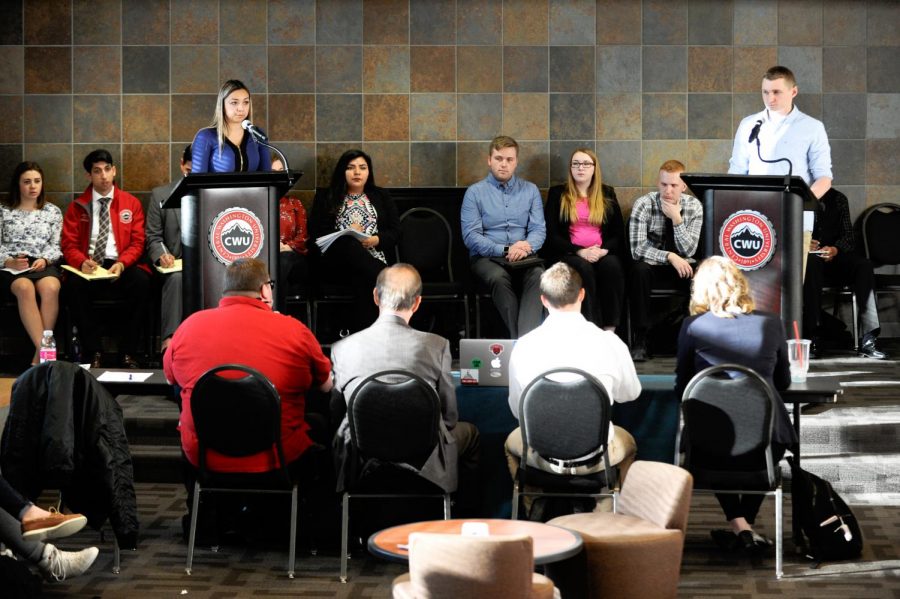ASCWU candidates take the stage
ASCWU candidates meet to debate in the Surc Pit.
April 12, 2018
ASCWU candidates gathered in the SURC Pit Wednesday, April 4 at noon for public debate. Questions for the hopeful candidates focused primarily on equity and inclusivity.
About 50 students and a few faculty members listened to a list of questions from a panel consisting of three election commission members and Dean of Student Success William Schafer. Commission members included Chairman Eric Bennett, Taylor Tahkeal and Arber Denniri.
When asked if CWU was performing poorly regarding equity and inclusivity, a couple candidates agreed the university could improve, but “poorly” was the wrong word choice.
Jessica Hernandez, who is running for Vice President for Equity and Community Affairs, believes CWU is doing a poor job of promoting Equality and Services Council organizations. She would like the university to do more to promote those groups.
Bailey Kinker, candidate for Vice President for Clubs and Organizations, believes inclusivity goes deeper than just being welcomed to CWU.
“It’s one thing to be welcomed into a home; it’s another to feel included,” Kinker said.
Equity, inclusivity and equality were the focus of a majority of the questions. Some of the candidates appeared to be nervous, while others seemed more comfortable speaking at the podium. After questions from the commission concluded, the audience was welcomed to ask questions regarding any topic. Some of the audience had left by this time, only about 30 remained.
Questions from the audience covered more topics than those from the commission. One regarded gauging student feedback and how candidates would consider it.
Stan Southern, who is running for re-election for Vice President for Clubs and Organizations, alluded to the built-in survey builder in MyCWU as a tool to gauge student feedback.
JR Siperly, candidate for Vice President for Academic Affairs, suggested the best method to find solutions for student feedback is holding multiple discussions.
Another question from the audience asked the candidates how they would maintain a budget if elected.
“It is up to the students where money goes,” Southern said.
A proposed multi-cultural center, which is part of a planned SURC expansion, was one topic nearly all candidates agreed upon.
“This is a building for the students paid for by the students,” said Leah Mobley, who is running unopposed for Vice President for Legislative Affairs.
The election commission felt the debate went very well, citing there was actual debate amongst the candidates.
“The whole point of a debate is to challenge each other,” Denniri said.
Bennett believes this group of candidates better represents more diversity and background than previous elections and Election Coordinator Edwin Rodriguez thinks the group of candidates has more experience in leadership positions than past candidates.
Myrinda Wolitarsky, current Vice President for Equity and Community Affairs, went through the elections process last year on the campaign trail. According to Wolitarsky, this year’s election is much more organized due to scheduling.
The election last year was scheduled later in the spring, resulting in the current student government not swearing into office until finals week of spring quarter. This left very little time for previous ASCWU members to train Vice Presidents elects.
This year, with the election cycle occurring earlier in the spring, the candidates running for election now will be sworn into office in mid-May, said Wolitarsky. This will give them nearly a month to be trained by current student government members.
“I wish I would have had someone to give me… you know, learning the ropes,” Wolitarsky added.
As for this crop of candidates, Wolitarsky is confident they can uphold the mission of ASCWU. She believes the advanced election cycle and month of training for newly elected student government members will be very beneficial to maintaining ASCWU goals.
“Everyone that is running will have the ability to do that,” Wolitarsky said.
Her advice for Hernandez and Watkins, who are running for the position Wolitarsky currently holds, is to reach out to get student feedback and have the patience and motivation to know they are making a difference. The position is unique in that it represents the voices of marginalized groups, said Wolitarsky.
Election day is nerve-racking and exciting, according to Wolitarsky. She doesn’t think many know the hard work that goes into earning votes. Her GPA reached a low point during the quarter she spent the most time campaigning. School work became her lowest priority, but the lead up to election day was the part Wolitarsky enjoyed most.
“I loved campaigning,” Wolitarsky said. She recalled asking students to vote for her with an inflatable donut around her waist saying, “Donut forget to vote for me.”
Finding out she had won her race was exciting and overwhelming.
“Oh my word, I have so much to do,” Wolitarsky recalled when seeing the results.


